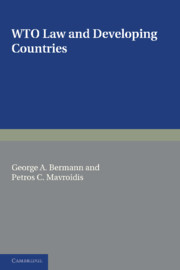Book contents
- Frontmatter
- Contents
- Contributors
- Developing Countries in the WTO System
- 1 The Legal Status of Special and Differential Treatment Provisions under the WTO Agreements
- 2 Trade Preferences to Small Developing Countries and the Welfare Costs of Lost Multilateral Liberalization
- 3 China in the WTO 2006: “Law and Its Limitations” in the Context of TRIPS
- 4 Developing Countries in the WTO Services Negotiations: Doing Enough?
- 5 Developing Countries and the Protection of Intellectual Property Rights: Current Issues in the WTO
- 6 Participation of Developing Countries in the WTO – New Evidence Based on the 2003 Official Records
- 7 Developing Countries and GATT/WTO Dispute Settlement
- 8 Representing Developing Countries in WTO Dispute Settlement Proceedings
- 9 Compensation and Retaliation: A Developing Country's Perspective
- 10 A Preference for Development: The Law and Economics of GSP
- 11 The GSP Fallacy: A Critique of the Appellate Body's Ruling in the GSP Case on Legal, Economic, and Political/Systemic Grounds
- 12 Is the WTO Doing Enough for Developing Countries?
- Index
10 - A Preference for Development: The Law and Economics of GSP
Published online by Cambridge University Press: 04 August 2010
- Frontmatter
- Contents
- Contributors
- Developing Countries in the WTO System
- 1 The Legal Status of Special and Differential Treatment Provisions under the WTO Agreements
- 2 Trade Preferences to Small Developing Countries and the Welfare Costs of Lost Multilateral Liberalization
- 3 China in the WTO 2006: “Law and Its Limitations” in the Context of TRIPS
- 4 Developing Countries in the WTO Services Negotiations: Doing Enough?
- 5 Developing Countries and the Protection of Intellectual Property Rights: Current Issues in the WTO
- 6 Participation of Developing Countries in the WTO – New Evidence Based on the 2003 Official Records
- 7 Developing Countries and GATT/WTO Dispute Settlement
- 8 Representing Developing Countries in WTO Dispute Settlement Proceedings
- 9 Compensation and Retaliation: A Developing Country's Perspective
- 10 A Preference for Development: The Law and Economics of GSP
- 11 The GSP Fallacy: A Critique of the Appellate Body's Ruling in the GSP Case on Legal, Economic, and Political/Systemic Grounds
- 12 Is the WTO Doing Enough for Developing Countries?
- Index
Summary
Introduction
The WTO case brought by India in 2002 to challenge aspects of the European Communities' Generalized System of Preferences (GSP) brings fresh scrutiny to a policy area that has received little attention in recent years – trade preferences for developing countries. The idea for such preferences emerged from the first United Nations Conference on Trade and Development (UNCTAD) in 1964. The ensuing negotiations led to Resolution 21(ii) at the second session of UNCTAD in 1968, acknowledging “unanimous agreement” in favor of the establishment of preferential arrangements. Tariff discrimination violates the most-favored nation (MFN) obligation of GATT Article I, however, and thus the legal authority for preferential tariff schemes had to await a GATT waiver of this obligation, which came in 1971. The waiver was to expire after 10 years, but the authority for preferences was extended by the GATT contracting parties Decision of November 28, 1979 on Differential and More Favorable Treatment, Reciprocity and Fuller Participation of Developing Countries, popularly known as the “Enabling Clause,” and now incorporated into the law of the WTO along with the GATT itself.
Although trade discrimination favoring developing countries is the essence of any GSP scheme, India's WTO complaint raised the question of what type of discrimination is permissible – must all developing countries be treated alike, or can preference-granting nations discriminate among them based on various sorts of criteria? The European system challenged by India afforded more generous preferences to the least-developed countries (LDCs), to developing nations that undertook certain measures to protect the environment and labor rights, and to 12 nations involved in efforts to combat drug trafficking.
- Type
- Chapter
- Information
- WTO Law and Developing Countries , pp. 255 - 305Publisher: Cambridge University PressPrint publication year: 2007



